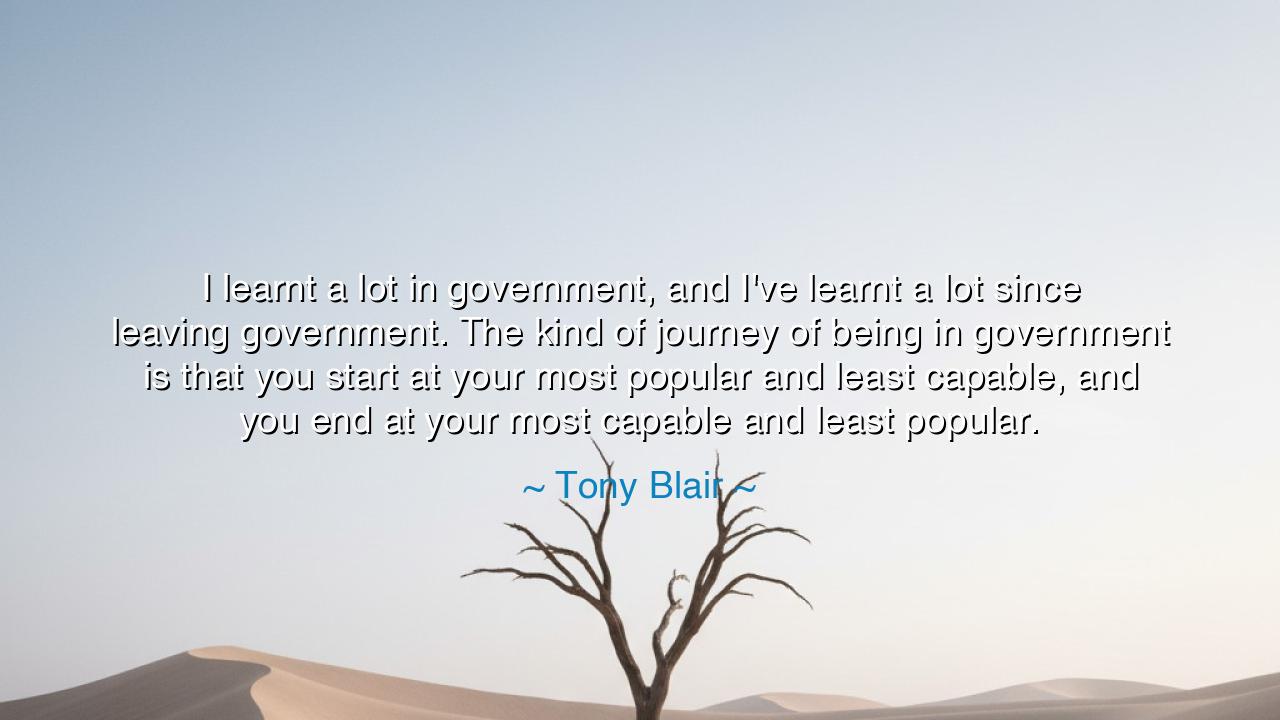
I learnt a lot in government, and I've learnt a lot since leaving
I learnt a lot in government, and I've learnt a lot since leaving government. The kind of journey of being in government is that you start at your most popular and least capable, and you end at your most capable and least popular.






"I learnt a lot in government, and I've learnt a lot since leaving government. The kind of journey of being in government is that you start at your most popular and least capable, and you end at your most capable and least popular." – Tony Blair
In these reflective and humble words, Tony Blair, former Prime Minister of the United Kingdom, speaks of the great paradox that shadows all leadership. His statement unveils a truth that transcends politics and enters the realm of human experience: that wisdom often comes at the cost of affection, and that true capability is forged in the crucible of unpopularity. When he says that one begins “at your most popular and least capable,” Blair alludes to the intoxicating early days of leadership, when the people’s hopes shine brightest and the leader’s inexperience is hidden beneath the glow of promise. Yet as time passes, as choices grow heavier and compromises become unavoidable, that light dims. What remains, however, is not illusion but understanding, earned through struggle and the sometimes-painful work of governance.
The origin of this quote lies in Blair’s reflections after leaving office, when he had time to look back upon his decade as Prime Minister. He had risen to power in 1997 on a wave of optimism known as “New Labour,” uniting progressive ideals with pragmatic governance. In those days, his approval soared—the nation adored him as a symbol of renewal. But by the time he left office in 2007, that popularity had waned, overshadowed by controversy, especially over Britain’s involvement in the Iraq War. It was in that twilight of reputation that Blair realized a painful truth: that leadership matures through storms, not celebrations, and that by the time one truly learns to govern wisely, the world has already grown weary of one’s face.
This paradox is not unique to Blair—it is written across the ages. Consider Abraham Lincoln, who entered the presidency beloved for his integrity but soon faced a nation tearing itself apart in civil war. As he learned the cost of unity, the weight of command carved lines into his face and drove many to hate him. Yet by the time he had mastered the art of holding a broken nation together—when his wisdom had ripened—he was struck down, his greatness only fully recognized in death. So too it is with all true leaders: they trade affection for endurance, applause for truth. The crowd cheers beginnings; it rarely honors perseverance.
Blair’s quote also speaks to a deeper cycle that defines all human growth. In every endeavor—whether one leads a nation, a family, or a company—one begins with enthusiasm and ends, if one is honest, with understanding. At the start, people adore the dream; at the end, they face the reality. The early stage is filled with promise but little substance, the later one with wisdom but little grace. Yet it is in that final stage—the unglamorous season of unpopularity—that character reveals its full strength. To lead well, one must be willing to lose the love of others in order to do what is right.
There is something profoundly ancient and stoic in Blair’s insight. It echoes the wisdom of Marcus Aurelius, who wrote that the duty of a ruler is not to be loved, but to serve the good of his people, even when they despise him for it. The leader who craves eternal popularity will never make the hard decisions that truth demands. And so, Blair’s words remind us that popularity is fleeting, but competence, integrity, and wisdom endure. The journey from beloved novice to seasoned leader is a journey from illusion to reality, from comfort to courage.
Even beyond politics, the message applies to all who dare to take responsibility. Teachers, parents, and mentors experience the same arc: at first admired, later questioned, finally respected. When the fruits of discipline or reform appear harsh, gratitude may vanish—but the results, like deep roots, outlast the storm. In this, Blair’s reflection becomes universal: growth and gratitude seldom coexist in their own time; the former is understood only when the latter returns through memory.
The lesson of this quote is both humbling and ennobling: do not fear the loss of popularity if your conscience remains intact. Every worthy path—whether of governance, art, or morality—demands endurance beyond applause. Strive not to be loved, but to become capable, wise, and just. Learn deeply, act courageously, and accept that admiration fades even as mastery grows. For when the cheers fall silent, and the burden of leadership has taught its hardest truths, one may look back—like Blair—and know that what was gained in wisdom was worth far more than what was lost in praise.






AAdministratorAdministrator
Welcome, honored guests. Please leave a comment, we will respond soon